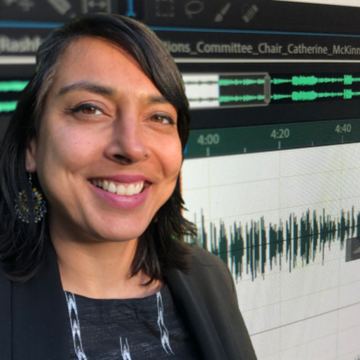Nina Robinson (née Dhami), founder of Soundtruism

Nina Robinson is CEO and founder of Soundtruism, a media production company specialising in factual narrative podcasts, based in Birmingham, West Midlands; the company specialises in podcast production, training and consultancy and organises the annual Birmingham Podcast Festival; its ambition is to create compelling podcasts on local issues that have global impact. Nina is an award-winning documentary maker and senior journalist who has travelled the world making audio documentaries for the BBC World Service on subjects ranging from dog-fighting in south-side Chicago, forced criminal confessions in Japan, freedom in Libya post-Qadaffi and the notorious drug kingpin, ‘Dudus’ in Jamaica. She founded the company in 2021 after the leaving the BBC 6 months prior and has been working hard to establish the company’s commercial arm which has already received numerous BBC commissions and has worked for charities such as Greenpeace and with Birmingham City University where Nina is also a fellow of the Sir Lenny Henry Centre for Media Diversity and Fellow of Higher Education Authority (FHEA). Currently looking for investors, Nina has made the long-list for the Deutsche Bank Investment Accelerator – out of 573 applications, Soundtruism has made it to the final 20!
What is your background? What made you decide to get involved in supporting entrepreneurs?
I was inspired to become a CEO of my own company because I could not see anyone like me at the top of a media production company in the UK, especially in the field of factual audio storytelling and journalism which is particularly elitist. In my career at the BBC I experienced concrete ceilings whilst being relied upon to troubleshoot and lead on complex projects. Promotions went to candidates with little comparative experience but who were seen as a ‘good cultural fit’. Throughout my career I have had to battle stereotypes on numerous fronts – being South Asian, female and a Brummie! These experiences have made me realise the limitations of social mobility in the UK. Both my grandfather and father are an inspiration to me as they understood the importance of entrepreneurial endeavour to realise your full potential. In order to fully succeed on the basis of your own hard work and effort so that the income you generate, goes to you rather than being extracted by others. As first and second-generation immigrants from Punjab; they both built enterprises from nothing, and I want to do the same. The idea to create an enterprise that disrupts the audio journalism status quo, to genuinely empower people of colour in media, is a key inspiration behind the business. As is fighting injustice through storytelling, which is the basis of Soundtruism’s social impact ambition.

Entrepreneurship so far for me has been multi-tasking, networking, getting to know people and establishing new working relationships. It has involved being strategic and thinking strategically and trying not to get lost in the weeds whilst also paying attention to detail. It has also been about empowering others as well as being open to learning and growing yourself mentally – being open minded and open to possibilities. It’s also about facing your fears and learning to be fearless.
How and when did you know your idea was good enough to develop it?
I knew my idea was good enough for many years prior to leaving the BBC. I was thinking clearly about the possibilities of podcasting as early as 2016 when I was disseminating podcast strategies to radio teams who were asking me constantly. ‘what is a podcast’ and ‘why is it different to radio?’. My company strategy has developed a lot since I launched the company in 2021. I started thinking more widely about my values and what I felt was needed in the industry and how to make that vision sustainable and profitable. The growth in online audio listening year on year (a massive 5% growth just last year 2021-22) also confirms my strong belief in the idea going forward.
What would you say are the top 3 skills that needed to be a successful entrepreneur? Why?
There are many skills and I think this is different for different people – these are the ones for me. I think even more importantly than skills, you need time, support and energy.
Skill 1: Communication skills – to present clearly and talk to people
Skill 2: Canva – the amount of times I have relied on Canva for social and presentation content!
Skill 3: Leadership – confidence in decision making so that you can move forward, even if it’s a mistake you can still rest easy in your decisions as you learned something in the process.
What is your favourite part of being an entrepreneur?
Managing my own time (even though I don’t have much spare time!) it feels good to be able to be feel that I am in charge of my own destiny and what I am doing or what I achieve is down to me is a real boost. My main best thing is feeling that I am empowering others, giving and providing opportunities.
What individual, company or organization inspires you most? Why?
It is Sonita Alleyne who co-founded the media production company, Somethin’ Else and who is now the first woman to become a Master of a Cambridge University college. I have not met Sonita (yet) but her story and journey are very inspiring to me as she led a successful media production business and did it her way. I listened to her selections on Desert Island discs and her choices made me admire her even more! I love that she has worked on so many boards as exec and non-exec and has spread her influence which I also believe to be very important.
If you had 5 minutes with the above individual/ company/organization, what would you want to ask or discuss?
What were the early days of founding your company like for you? What advice could you offer someone trying to set up a media production company today? What have you learned about how to be successful in this industry? Do you have any regrets? I would like to discuss with her thoughts on media diversity and how she found being a woman of colour in the industry and also about finding your freedom and your voice, does she feel it’s still important to bite her tongue or not to say anything if there are problematic things happening around her? How best do you think you can manage to effect change?
What has been your most satisfying or successful moment in business?
When we just staged the first Birmingham Podcast Festival at Birmingham City University earlier this year and when that day came, I was so grateful and satisfied that all our hard work had paid off and more. Hearing the discussions and seeing the people and magic coming together was well, magic!
What would you say have been some of your mistakes, failures or lessons learned as an entrepreneur?
I feel I need to switch my attention more to cashflow and projections. I employed an accountant early on to take away some of the thoughts around taxes and company accounts off my plate, but I feel I need to take more ownership of this going forward. I have always been great at personal financial management and love an Excel spreadsheet, maths is one of my strong points, so it should not be an issue. I think I should not be too careful with money and not be afraid to make bigger investment decisions and risks where needed.
How have you funded your ideas?
I have been bootstrapping the business as everything earned from projects has been put back in. I have taken on additional jobs and been self-funding. For the Podcast Festival, I brought commercial partners on board, including Birmingham City University, Create Central 2 x private investors and a local business donated 2 x podcast microphones for our competition which ran on socials.
Are there any sector-specific awards/grants/competitions that have helped you?
I recently attended an event in Munich, Germany which was for media start-ups and linking them with investors. They have a grant which they have invited me to apply for.
If a new entrepreneur or startup came to you looking for entrepreneurship resources, where would you send them?
YouTube! I’ve loved reading Rachel Rodgers entrepreneur’s book. In Birmingham the GBSLEP Growth Hub and TAG diverse entrepreneur’s network have been great.
Have you faced any challenges as a woman entrepreneur? If so, how have you overcome them?
I have 2 children – 8 and 16 years old. I have a brilliant mom’s network that I rely on and also my mum god bless her. Having children really adds to the juggling although it also helps me be very strict with my time which means I am highly productive in allocated time slots which I think also works in my favour to be honest. I don’t waste a second!
What resources would you recommend for other women?
See above re. Rachel Rodgers and local entrepreneur networks.
How could institutions such as the University of Oxford better support women entrepreneurs?
Platform women speakers and add their profiles to Oxford Uni websites.
Do you have any advice specifically for other women who want to be entrepreneurs?
Go for it and don’t wait, you’re ready now and will learn it all along the way.
Any last words of advice?
Believe in yourself and don’t let anyone discourage you, don’t be afraid to delegate – in fact try and do this as often as you can!
Share this
More news



